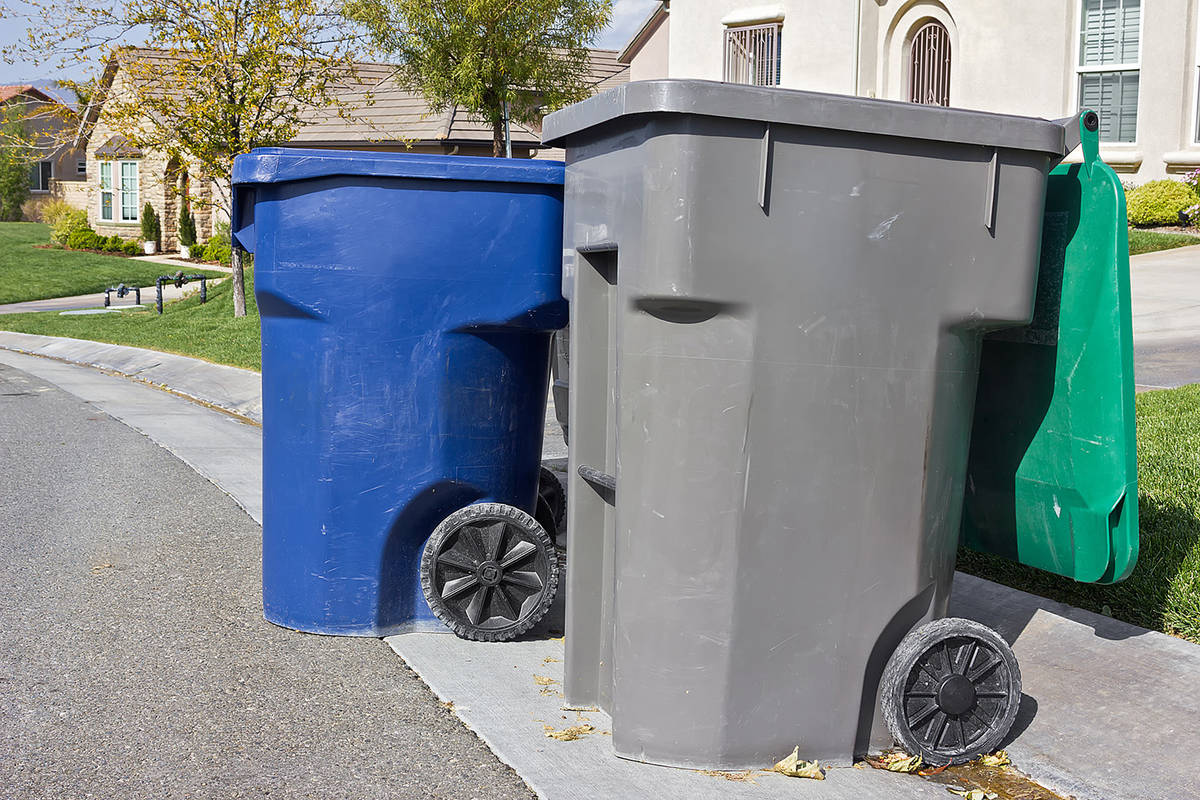State law backs HOA rules on garbage cans
Q: I am a resident of a gated community in southwest Las Vegas. We’ve lived in this community for a year and a half. Our house is on the right side of the road. There is no neighbor at our left, and there is a wall between our house and road.
We always place our garbage can on the side of our house but not in the gate at our backyard. It is outside of our backyard gate, and there is a wall on the side. We recently received a violation notice from our homeowners association. The board has ordered us to remove the trash can from the common area view and visible site, which is our site. Is that a common area? It belongs to our house and it’s our property.
I don’t understand why we can’t place them on our property? (Can) we move them to inside our backyard gate? They are still visible because we don’t have a screen door. This confuses me. In this community not only our trash can is visible.
In a letter the HOA sent to us it said that living in a planned community involves the “consideration of all residents to abide by the covenants, conditions and restrictions. One reason for having CC&Rs is to protect the rights of homeowners in the community, both yours and those of your neighbors.”
It went on to say: “Another reason is to assure that everyone maintains their properties in a manner that is consistent with other properties in the association. We understand the following noncompliance item may just be an oversight. Please be aware that the following condition has been noted on the property and is not consistent with the community standards outlined in the governing documents. The non-compliance must be corrected within 14 days.”
The rules do say: “No garbage or trash shall be placed or kept on any unit, except in covered containers of a type, size and style that are approved by the Architectural Review Committee or as required by the applicable governmental agency. In no event shall such containers be maintained so as to be visible from neighboring property except to be made available for collection and then only for the shortest time reasonably necessary to effect such collection or as otherwise set forth in the association rules.
This HOA has always given us hard time So please help us to figure this out. Thank you very much and have a nice day!
A: The association has the right to develop rules and regulations. Under Nevada Revised Statutes 116.332 (2), an association may adopt rules that reasonably restrict the manner in which trash containers are stored on the premises. Under subsection 2b, the association can require trash containers be stored in the rear or side yard of the unit, if such locations exist and in such manner that the containers are screened from view from the street, a sidewalk or any adjacent property.
My advice you is to comply with the association to avoid being fined.
Q: I anxiously look forward to reading your weekly column in the Las Vegas Review-Journal for valuable information regarding HOA concerns.
My question: What actions can an HOA take against a former board president who blatantly and knowingly circumvented NRS 116.31086? This person now chairs the committee for which the violations directly prospered.
I appreciate any guidance on this matter.
A: NRS 116.31086 pertains to the solicitation of bids for association projects. The law states that if an association solicits bids, the association whenever reasonably possible solicit at least three bids if the association project is expected to cost:
1. 3 percent or more of the annual budget for an association that consists of fewer than 1,000 units.
2. 1 percent or more of the annual budget for an association that consists of 1,000 units or more.
The bids must be opened and read aloud at a board meeting.
Association projects include without limitation projects pertaining to maintenance, restorations of the common amenities and professional services such as accounting, engineering and legal.
You do not provide any specific information as to the alleged violation by the committee chair. If you were to file a formal complaint to the Nevada Real Estate Division, you would need to include specific examples of how the above regulations were not followed.
Barbara Holland is a certified property manager and holds the supervisory community manager certificate with the state of Nevada. She is an author and educator on real estate management. Questions may be sent to holland744o@gmail.com.






















